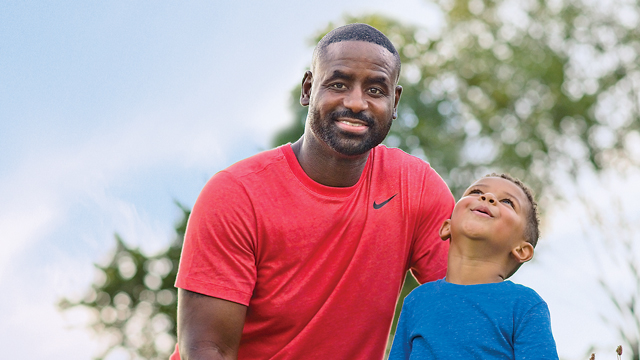Watching your child’s athletic aspirations evolve from a distant dream to an attainable reality is a goal many parents have for their young athlete. The intensity of sports at the middle and high school level has increased exponentially over the years. As a result, so has the youth sports industry. At the training center I own, I work with some of the best young athletes in the region. But I also help parents navigate the sometimes tricky youth sports terrain. Here is the best advice I have: While student athletes are chasing their dreams on the field, parents play an integral role on the sidelines to support their child’s athletic journey.
 Here’s how:
Here’s how:
Look for the Passion
If your children are truly in love with a sport, they will take their own initiative to prepare for practice and games. With dedication and focus, a child’s dream can take the form of a reality on the field. Get excited and celebrate every victory, both big and small, along the way.
Make It Fun
Speaking of passion, keep it positive! One of the most important parts of youth sports is the ability to have fun on and off the field. Help kids cultivate a love for the sport beyond training and practice. You are their guide. Take them to live sporting events. Watch sports on TV together. Find out who they look up to in the sporting world and get them some gear, such as a poster to hang in their bedroom or a jersey. I’m a firm believer that in order to be great, you have to see it first.
If a child is meant to be the next great athlete, his or her life will be consumed by the sport soon enough. Now is the time to make memories and do the fun stuff. Your family’s entire life should not revolve around sports schedules when your children are young. There will be plenty of time for that as their career progresses. So take family vacations, allow sleepovers, and encourage other hobbies and activities. Kids are only young for a short time, so let them (and you) enjoy it for as long as they can.
Encourage Them to Play Multiple Sports
In youth sports, specialization is happening earlier and earlier. I highly encourage the athletes I train to play multiple sports. Being a multi-sport athlete will only make them better at their primary sport, as there are certain competitive dynamics that one sport may teach that another may not. In addition to skill development, your child will also learn how to be a great teammate, as they may be a star player in one sport, but have a supplementary role in another. Learning how to fulfill that role is an important part of overall athletic development. All the youth, high school, and college coaches I talk to prefer the toughness that multi-sport athletes bring. Your child is only a kid once, so let them play as many sports as they can and enjoy it for as long as possible.
Build Up Their Confidence
Confidence may be a young athlete’s most important intangible to set them apart from the competition. As a parent, you can help to instill confidence in young athletes
in a few ways. First, help them increase their knowledge base of the sport, as everyone knows knowledge is power. They will be able to draw on that knowledge in game play. Second, encourage your athlete to fall in love with the process of getting better, as confidence will come from repetition through practice. And third, find an environment for your kids to have success during training so they can emulate that same success during competition.
The ride or walk home from a game also provides a key opportunity to build confidence in your young athlete. Using the time to encourage and praise them, rather than critique them, will help them build confidence and stay engaged, even after a loss.
Build in Rest and Recovery Time
As everyone knows, training and practicing is important to the development of a young athlete. However, the proper rest and nutrition is just as important for athletes to reach peak performance. That means getting eight to ten hours of sleep a night, staying hydrated, and eating a balanced diet. These lifestyle habits will aid in achieving maximum performance, while possibly reducing the risk of injury.
In addition, monitor your athlete’s temperament and energy levels throughout the year to be conscious of over-training. If you decide to invest in sports performance coaching, make sure your child’s training sessions are managed in coordination with practice and game schedules, and that the workouts are appropriate for in-season or off-season training.
If your child has athletic talent, consider yourself blessed to have a gifted child. But don’t smother your child’s enthusiasm by getting too serious too soon. Let the flame ignite and grow on its own as much as possible, while still being steadfast in your support. As performance coaches, we are here to help you along the way if you need guidance, as we’ve been down the path to success. Best of luck – and remember, always keep it fun!
Photo: Scott Schwartzkopf




